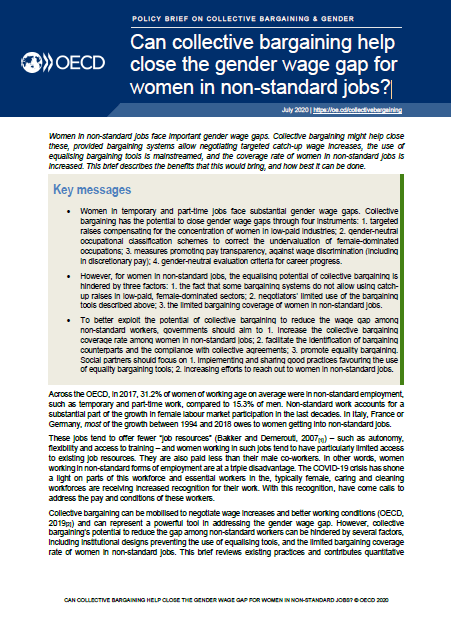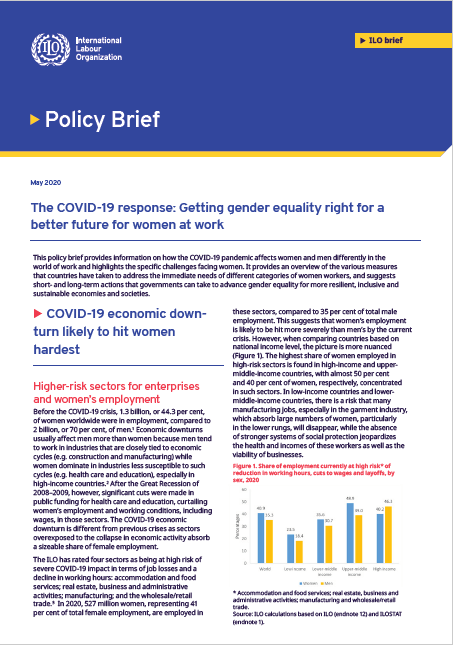Can collective bargaining help close the gender wage gap for women in non-standard jobs?


By Megan O’Donnell (Center for Global Development), Ania Calderon (Open Data Charter) and Callie Strickland (The B Team)
With an estimated 250+ years until the world reaches economic gender parity, gender pay gaps have proven tough to close. As these gaps are symptoms of broader structural inequalities, they cannot be addressed in isolation or with quick fixes.
As a starting point for action, the Center for Global Development, the Open Data Charter, and The B Team, within the framework of the Equal Pay International Coalition (EPIC), recently co-hosted the first in a series of webinars focused on evidence-based solutions to address persistent gender gaps in economic opportunity and pay. Government leaders, as well as representatives from the private sector and labor unions, gathered to discuss actions they are taking and provided reactions to a draft policy memo outlining key solutions for governments and businesses to champion.
The following questions and reflections were shared during the webinar:
How do we break out of the echo chamber and better engage men in the fight for gender equality?
Men still hold the majority of decision making positions as CEOs, heads of government, and senior managers that will need to be engaged in order to advance women’s economic opportunity and equal pay. Men need to be brought along the journey and reassured that closing gender pay gaps will not only benefit women, but will also bolster business performance and strengthen the global economy. While there is a need for more data, there is evidence that inequality leads to lower levels of perceived fairness and trust that equality can lead to social cohesion.
How can we ensure an intersectional lens to solving the challenge of gender pay gaps?
Despite ample evidence of racial pay gaps (Black women in the U.S. earn $0.75 for every $0.81 earned by white women and $1.00 earned by white men), race is often ignored in gender pay gap discussions and disclosures which prevents meaningful progress towards pay equality for all people. Governments and businesses must consider and measure the impact of race and ethnicity (among other identity markers) when working to address and permanently close pay gaps.
Where do we need to strengthen the evidence base?
As is true with any challenge – “what gets measured gets done”. A critical starting point for addressing pay gaps is to track and monitor pay differentials. Data must account for the diversity of the workforce. Webinar participants agreed that there is a need to understand implicit drivers of pay gaps and approach inequality with an intersectional view that includes race, ethnicity, age, sexuality, disability, socioeconomic background and more. It was also raised the causal linkages between pay data transparency and the narrowing of pay gaps that actually benefit women.
How do we comprehensively tackle underlying challenges?
As mentioned above, pay gaps are symptoms of broader structural inequalities. Quick fixes will not ensure lasting change . Compliance of 173 countries that have ratified the ILO Equal Remuneration Convention, 1951 (No.100) is a start, but this requires further actions to change cultures and established practice, such as making use of the ILO supervisory system, and others from international bodies such as UN Treaties monitoring bodies and Special Procedures of the Human Rights Council.
If you haven’t been able to attend the webinar, you may find the recording here.
Achieving pay equality will require a meaningful commitment and collective action between government, business, labour unions and civil society. We believe that these conversations are a starting point, yet know there is much more work to be done.
If you are interested in working together to close gender pay gaps, please reach out to [email protected]. We will soon publish our Advancing policy solutions to close gender pay gaps memo. At the Open Data Charter, as a proud member, we encourage you to join EPIC, the only multi-stakeholder initiative with the goal to achieve equal pay for women and men everywhere. To find out more please visit the website.

In February 2020 , in collaboration with the Government of Germany, EPIC organised a meeting for its members including representatives from governments, workers and employers organizations, civil society organizations. Approximately 65 participants came together to understand the impact and challenges of implementing measures aimed at reducing the gender pay gap. Over the two-day event, participants discussed how wage transparency policies aimed at addressing longstanding gender wage gaps have been gaining momentum over the past few years. Canada, France, Germany, Iceland, Jordan, Portugal, Switzerland and the UK shared their journey. Their recommendations include the provisions of robust support to companies through pay equity plans, training, guidelines, online assistance, pay audits, pay certification and tools. The success of these policies depend on the active engagement of workers, employers, business and civil society. A summary report of the meeting’s findings and conclusions may be found in the community forum.

“The government of Switzerland is proud that LOGIB has been labeled as an EPIC good practice” says Sylvie Durrer, Director of the Federal Office for Gender Equality (FOGE).
In Switzerland, women earn on average 18% less than men. Employers are responsible for ensuring equal pay. Yet, most employers are unaware of wage discrimination and assume that pay equity is being respected in their companies. However, pay discrimination must first be identified before it can be eliminated. Regular equal pay analyses ensure transparency and show whether women and men are actually receiving equal pay for work of equal value. Employers in Switzerland can find out where their company stands by simply verifying their own pay practices. The Swiss Government has developed an online tool based on regression analysis providing companies access to a free and practical equal pay self-test that requires a minimum of time and effort and does not call for any specialist knowledge. This tool is called Logib and is available free of charge on the FOGE website.
Logib is suitable for companies with 50 employees and more. Logib is an easy to use, Excel-based program that can quickly provide a picture of the current situation. It is free to use and available in four languages; English, French, German and Italian. Should the test reveal any gender-specific pay differences, it is advisable to carry out analyses in greater detail. The FOGE has a list of companies and organisations that advise or assist companies in examining pay equality. They can help to interpret results or conduct a complete equal pay analysis. Companies can also take part in “Commitment to Equal Pay” (ELEP), to test their pay with regard to social partners and eliminate any discrimination.
Since 2006, Logib has also been used for government-run checks at the national, federal and local level to ensure equal pay in the public procurement and/or subsidies system. The federal government ensures that the Logib model is continuously updated and amends these guidelines accordingly to take account of any technical or legal developments, such as those relating to the definition of what constitutes ‘pay’. The FOGE also provides financial support to projects aimed at the realisation of equal pay for men and women in line with the Gender Equality Act (1995). Anyone interested can consult the findings in the Topbox project database. Thanks to its commitment to equal pay, Switzerland received the 2018 UN Public Service Award.
Sylvie Durrer added “As we all slowly try to come to terms with the economic impact of the global crisis caused by COVID-19, it is important that employers continue to recognise and value women’s work. We are delighted that our simple and concrete tool will be available to companies all over the world, so that they can continue to live up to their commitment to equal pay, ensuring a lasting and concrete recognition of women’s essential role in the world of work. “